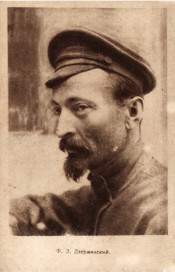
Felix Dzerzhinsky is a “Heart of the Revolution”
September 11, 2019 marks 142 years since the birth of Felix Dzerzhinsky. The Presidential Library’s electronic collections contain unique materials that spotlight the life and work of a famous Soviet statesman, founder and head of the All-Russian Extraordinary Commission to Combat Counter-Revolution and Espionage. The institution’s portal also provides access to the thematic tablet exhibition “The Shield and Sword of the Revolution”: Marking the 100th anniversary of the All-Russian Extraordinary Commission. Chekist in Life, Cinema and Literature” and a virtual tour of the exhibition “The Saving Sword of the Revolution: Chekist in Life, Cinema and Literature”.
Of great interest to researchers and anyone interested in Russian history is a video lecture “Unknown Dzerzhinsky” (2016). Ilya Ratkovsky, Ph.D. in History, specialist of the Department of Contemporary History of the Institute of History of St. Petersburg State University, talks about little-known facts of the Iron Felix biography, how his personality and views were formed, how his political career was built in post-revolutionary conditions.
Felix Dzerzhinsky was born in 1877 near Minsk in his family estate. The future revolutionary came from an old family that is traced into the 17th century. He was well educated in music and poetry. In addition he was related to the national Polish poet Juliusz Slovacki.
Dzerzhinsky received his education in one of the best educational institutions of the Russian Empire - the gymnasium in Vilna. It was also visited by another famous politician - Pyotr Stolypin. It was there that the revolutionary “upbringing” of Felix took place. Despite the strictness of the mentors, the students of the gymnasium actively created underground circles. In many ways, the loss of life influenced the construction of the vector of Dzerzhinsky’s life - his older brother died at the hands of criminals. And the main dream of the “Iron Felix” was the fight against banditry. In 1919, at all costs he tried to get the post of People's Commissar of the RSFSR. He received this position.
Having become a people's commissar, Dzerzhinsky abolished the death penalty for some time. He resumed the highest measure - execution, but it was used only against official criminals, bandits and spies.
In addition, “Iron Felix” was also a thunderstorm of bureaucrats. He believed that action should be put at the forefront, and not countless papers. His words about this are available in the publication “Three Last Speeches” (1926).
Dzerzhinsky made a great contribution to the formation of the economy of a young Soviet country. In the service of the chairman of the Economic Council, he worked on the development of metallurgy, heavy industry and the preparation of an industrialization plan. In any work that Iron Felix undertook, he considered the same "iron" order and the "iron" responsibility of performers to be the most important. Thus, Dzerzhinsky wanted to achieve maximum efficiency from the functioning of any structure. You can verify this by referring to his “Three Last Speeches”, the transcripts of which are available on the Presidential Library’s portal.
The electronic collections of the Presidential Library help to consider the personality of the famous revolutionary in full and learn not only about his professional qualities, but also about his personality.
... Felix Dzerzhinsky lived a bright, but short-lived life. He died at the age of 48 on July 20, 1926 a few hours after the traditionally inspired, fiery speech at the plenum of the Central Committee on the state of the USSR economy. The death of the founder of the Cheka was struck by his like-minded people: with the departure of such people, an entire era is leaving. ““Dzerzhinsky died!” Did you, friends and comrades, know this person? We had a lot of heroes - and there are still many strong steel people in our “iron cohort”. But Dzerzhinsky was the only one of his kind. And we don’t have that anymore. Like a boiling lava of the revolution, and not just human blood flowing and seething in his veins. It is strange to imagine Dzerzhinsky asleep. It is almost impossible to imagine him dead”, - writes N. Bukharin.
In turn, Karl Radek is sure that without “Iron Felix” the revolution itself would have been impossible: “Dzerzhinsky passed away. For millions of the masses, his name was the banner of the undaunted fighter, was the banner of the protector of the workers and the poor. His name will go down in the history of socialism, as one of the best fighters of the proletariat. If Lenin’s masses will always be remembered as the brain of a revolution, then Dzerzhinsky will be remembered as its heart”.

